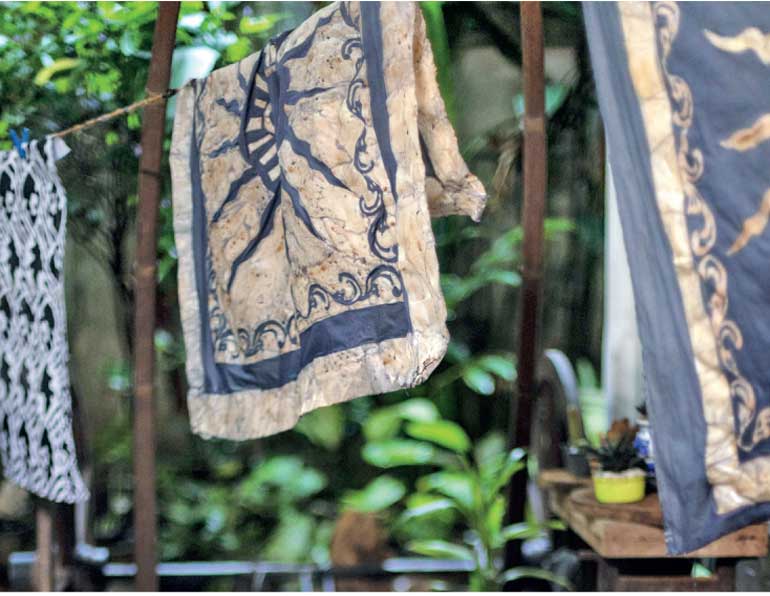Wednesday Feb 18, 2026
Wednesday Feb 18, 2026
Saturday, 13 July 2024 00:11 - - {{hitsCtrl.values.hits}}

Due to its wealth of natural and cultural resources, Sri Lanka has great potential for scaling up ethical, sustainable, and eco-friendly fashion – Pic credit: SLYCAN Trust
 Sri Lanka has a vibrant fashion and textile industry that has long been an important source of employment, export earnings, and economic growth. In addition to producing for global brands, it is also a significant part of the country’s cultural heritage with traditional practices such as handloom, batik, dumbara, beeralu, or jewellery-making. Furthermore, due to its wealth of natural and cultural resources, Sri Lanka has great potential for scaling up ethical, sustainable, and eco-friendly fashion—for example, through the use of natural dyes and fabrics or by repurposing factory waste and cutoffs.
Sri Lanka has a vibrant fashion and textile industry that has long been an important source of employment, export earnings, and economic growth. In addition to producing for global brands, it is also a significant part of the country’s cultural heritage with traditional practices such as handloom, batik, dumbara, beeralu, or jewellery-making. Furthermore, due to its wealth of natural and cultural resources, Sri Lanka has great potential for scaling up ethical, sustainable, and eco-friendly fashion—for example, through the use of natural dyes and fabrics or by repurposing factory waste and cutoffs.
However, the sector also faces a variety of risks related to market factors, global and domestic supply chains, and the climate crisis. On the one hand, Sri Lanka’s tropical climate has always posed certain challenges for the conservation of textiles due to its temperature and humidity levels, which can contribute to mould and degradation. On the other hand, the impacts of climate change present a range of new and emerging threats that include extreme weather events, heat stress, unreliable supply of raw materials, water scarcity, and power outages.
Understanding climate risks and impacts
The fashion and textile industry of Sri Lanka is vulnerable to climate change impacts due to its reliance on natural resources—such as agricultural products, fibres, and plant-based dyes—whose availability can be disrupted by erratic weather patterns, heavy rainfall, or prolonged droughts. Climate-related scarcity of water can also increase the cost of water-intensive processes within the fashion value chain as well as other operational costs, potentially reducing competitiveness on the global market.
Similarly, extreme weather events are likely to be more frequent and intense due to climate change, which poses a threat to factories, workshops, warehouses, transport infrastructure, or equipment. Floods, landslides, storms, and other climate-related disasters can cause damages and destruction as well as lead to loss of lives and long-term impacts on physical and mental health.
Another facet of climate impacts on the fashion and textile industry is the rise of day- and nighttime temperatures, which can severely affect the health and wellbeing of workers and entrepreneurs. Heat stress can cause overheating conditions such as heat exhaustion, heat cramps, heat rashes, or heat strokes. Particularly in a tropical country like Sri Lanka, heat can occur together with high humidity and reach potentially lethal “wet bulb” conditions that prevent the human body from cooling itself by evaporating sweat. Ensuring that workers in the apparel industry, particularly those in poorly ventilated factories, have adequate working conditions and are protected from these health risks is therefore a growing challenge.
By impacting this sector and the traditional crafts that form an integral part of Sri Lankan culture, climate change also has the potential to lead to cultural loss and affect the transmission of knowledge and craftsmanship from one generation to the next, as many younger people migrate towards urban centres or abroad for foreign employment.
The risks of climate change, which are often covariate and compounding with other risks, are especially high for small-scale entrepreneurs and village artisans, which usually lack financial buffers and safety nets that would allow them to recover after unexpected shocks. Long-term climatic changes, unpredictable weather, resource scarcity, and upstream impacts to their supply chains can make it difficult for these businesses to thrive and deter these micro- and small-sized enterprises from investing in innovative, sustainable, and climate-friendly practices or products.
The uncertainty and stress brought about by climate change and its economic consequences can take a toll on mental health. Workers and entrepreneurs who are facing job insecurity, loss of income, or displacement due to extreme weather events may experience increased anxiety and depression, which is an often overlooked but critical aspect of the overall impacts of climate change on human health and wellbeing.
Managing risks in the fashion and textile sector
As climate change is a reality, stakeholders in Sri Lanka’s fashion and textile industry need to find ways to adapt and manage these risks in proactive ways. This includes enterprise risk management plans and systems for larger factories as well as start-up and small-scale entrepreneurs, but also a variety of measures along the supply chains, infrastructure, and economic ecosystem that supports them. Flood-resistant buildings, heat stress management, improved drainage systems, climate-smart storage facilities, optimised resource use, and robust supply chain logistics are essential to maintaining stability and strengthening the sector’s resilience.
To preserve Sri Lanka’s cultural heritage, initiatives to support traditional crafts could be strengthened by investing further into existing systems and providing financial assistance, technical training, and market access to local artisans and designers. Promoting ethical, sustainable, and climate-friendly crafts and integrating them into fashion collections can also create new opportunities for traditional artisans and allow them to highlight a merger of traditional practices and modern design.
The way ahead
The climate crisis poses significant risks to Sri Lanka’s fashion and textile industry and compounds existing challenges and vulnerabilities. From the supply of raw materials to production costs and disaster risks, climate change poses a clear threat across the sector and can cause a multitude of adverse impacts on livelihoods, human health, and cultural heritage. However, if these risks are considered and managed through comprehensive risk management and a commitment to sustainability, the sector can adapt and thrive, utilising a unique opportunity to not only become more resilient but also preserve traditional crafts, reduce poverty, and foster green growth and prosperity.
(The writer works as Director: Research and Knowledge Management at SLYCAN Trust, a non-profit think tank based in Sri Lanka. His work focuses on climate change, adaptation, resilience, ecosystem conservation, just transition, human mobility, and a range of related issues. He holds a Master’s degree in Education from the University of Cologne, Germany and is a regular contributor to several international and local media outlets.)